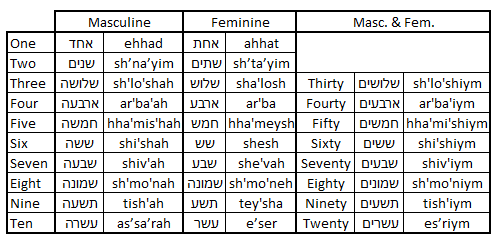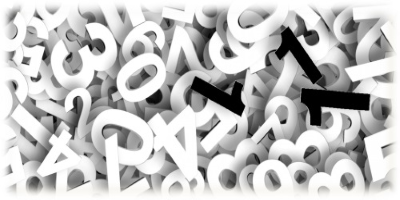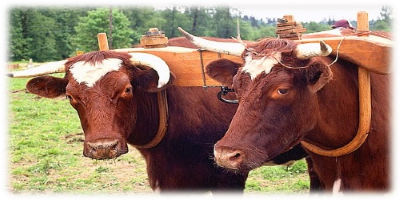When I began writing this article, I intended to provide a simple explanation of the history and use of the Hebrew word for "one" in the Hebrew Bible. But as I started writing, it soon became clear that in order to provide a proper and thorough explanation, I was going to have to give some background information about Hebrew grammar and how adjectives and numbers work in the Hebrew language, so please bear with me.
In Genesis 1:16 is the phrase "great lights." The word "lights" is a plural noun and "great" is the adjective modifying the noun. In Hebrew, an adjective is going to match the number and gender of the noun it is modifying. In the Hebrew, this phrase is written as גדלים ארות (orot gedoliym). The Hebrew word for "lights" is ארות (orot), which is the plural form of the word אור (or) meaning "light" and is a masculine plural noun, so the Hebrew word for great, the adjective, is also written in the plural masculine form, which is גדלים (gedoliym). Also notice that the adjective follows the noun that it modifies, rather than preceding it like we do in the English language.
Numbers are adjectives and in Hebrew an adjective will be either masculine or feminine, based on the gender of the noun the number is modifying. For instance, in Genesis 6:10 is the phrase "three sons." In Hebrew this is written as שלשה בנים (sh'loshah baniym). Baniym is the word for "sons," and שלשה (sh'loshah, Strong's #7969) is the word for "three." Because the word baniym is masculine, the masculine form for the number three (sh'loshah) is used. In Deuteronomy 19:2 is the phrase שלוש ערים (shalosh a'riym). The word ערים (ariym) means "cities," and שלוש (shalosh, Strong's #7969) is the word for "three." Because the word for "cities" is feminine, the feminine form of the number three (shalosh) is used. Note that we learned that Hebrew adjectives will follow a noun and will match the gender and number of the noun it is modifying. While numbers will match the gender of the noun, it will not match the number, and instead of following the noun, it will precede it.
Now let's take a look at the phrase "thirty shekels" as found in Exodus 21:32. In Hebrew this is written as שלשים שקלים (sh'lo'shiym sh'qa'liym). The word שקלים (sh'qa'liym) means shekels and is the plural form of the word שקל (shekel). The word שלשים (sh'lo'shiym) is the plural form of the number שלוש (shalosh) meaning "three." When working with numbers, the plural form of a number represents that number times ten (i.e. 3x10=30). So the word שלשים (sh'loshiym, Strong's #7970), the plural form of שלוש (shalosh), means "thirty." Let's take a look at another example. In Genesis 7:4 is the phrase ארבעים יום (ar'ba'iym yom). The word yom is a singular noun meaning "day." The word ar'ba'iym, the plural form of ארבע meaning "four," means "forty." So again, the number (an adjective) precedes the noun instead of following it, and is in the plural form, to represent the number forty, even though the noun it modifies is in the singular.
The Hebrew words for one, two, ten and twenty, work a little differently. The masculine form of "two" is שנים (sh'na'yim) and the feminine form is שתים (sh'ta'yim). The word for "ten" is עשרה (as'sa'rah-masc.) and עשר (e'ser-fem.) and the number for twenty is עשרים (es'riym), the plural form of the Hebrew word for "ten." The masculine form for the Hebrew word meaning "one" is אחד (ehhad, Strong's #259) and the feminine form is אחת (ahhat, Strong's #259). Below is a chart for the masculine and feminine and plural forms for the Hebrew numbers one through nine.

Now that we have a basic understanding of Hebrew adjectives and numbers, let's take a closer look at the Biblical Hebrew word for "one." In Genesis 42:13 we find the phrase "one man," which in Hebrew is איש אחד (iysh ehhad). The word iysh means "man" and the word ehhad means "one." But notice, the adjective ehhad does not precede the noun like other numbers; it instead follows it like all other adjectives but, it is clearly being used for the number "one," but it does not act like a number. Let's look at another example. In Genesis 27:44 is the phrase "few days," which in Hebrew is written as ימים אחדים (yamim ehhadiym) The word ימים (yamim) is the plural form of the noun יום (yom) meaning day. The word אחדים (ehhadiym) is the plural form of the word אחד (ehhad), which we previously found to mean "one." But notice that this word operates like all other adjectives and not as a number. It is plural because it is modifying a plural noun (unlike numbers) and it follows the noun it is modifying (unlike numbers). How can the word אחד (ehhad) be used as a number, but not as a number? If ehhad is not a real number meaning "one," is there a Hebrew word that does mean "one" and acts like a number? Yes, there is, but it is rarely used in the Hebrew Bible.
The Hebrew for the number thirteen is שלוש עשרה (sh'losh es'rey), which literally translates as "three ten." The Hebrew for the number Eighteen is שמונה עשרה (sh'mo'neh es'rey), which literally translates as "eight ten." The number eleven is written two different ways in the Hebrew Bible. The first is אחד עשר (ahhad asar), which can literally be translated as "one ten." The second is עשתי עשרה (ash'tey as'rey). We already know that as'rey means "ten," but where did ash'tey, which clearly means "one," come from? An important side note is that the word ash'tey (meaning "one") is only used in the Bible when it is combined with the word as'rey (meaning "ten") to mean "eleven."
As languages evolve over time certain idiosyncrasies occur within that language. Let's take an example from the English language. Nouns are made plural by adding "s" to the end of the noun. Some examples are boys, girls, trees, pots, pans and of course there are many others. But some words do not follow this rule of grammar. For instance man becomes men, mouse become mice, and deer is used for both the singular and plural. Many idiosyncrasies occur in Hebrew as well. The usual plural suffix for masculine Hebrew words is iym, which can be found in words like beniym (the plural form of ben - sons), batiym (the plural form of beyt - houses) and hariym (the plural form of har – mountains). However, the word for face is paniym (a singular noun with a plural suffix). The Hebrew for a tree is eyts, but the plural form etsiym means wood.
The word ehhad is one of the idiosyncrasies of Hebrew. It would appear that the original Hebrew word for "one" was ash'tey, but at some point in history, before the Bible was written, the word ash'tey was dropped for the number one, except in some cases where it remained attached to the word as'rey to mean "eleven." To represent the number "one," the word ash'tey was replaced with the word ehhad, which originally meant a "unit," a unit being "one" part of the whole. We can also see this through some words that are closely related to ehhad. The verb יחד (Y.HH.D, Strong's #3161) means "to unite" or "to join together." From this verb comes the noun יחד (yahhad, Strong's #3162), meaning "together," and the noun יחיד (yahhiyd, Strong's #3173), meaning "solitary."
Now that we have a better understanding of the Hebrew word ehhad, let's go back and look at the phrase ימים אחדים (yamim ehhadiym) from Genesis 27:44. We already know that the word yamim meant "days," but now we know that ehhadiym is the adjective meaning a "unit." So we can translate this phrase as "a unit of days."
Genesis 11:1 is a very interesting passage in light of this discussion. The King James Version translates this verse as; And the whole earth was of one language, and of one speech. The phrase "one language" is שפה אחד (saphah ehhad). The word saphah literally means "lip," but is also used for "language." The word ehhad we know means "unit," but is also used for the number "one." So we can translate this as "one language." Also in this verse is the phrase דברים אחדים (devariym ehhadiym). The word devariym is a plural noun meaning "words" and the word ehhadiym is the adjective meaning "unit," and is written in the plural only because the word it is modifying is in the plural. So we can translate this phrase as "a unit of words."
The reason that I have gone into so much detail on the word ehhad is because of its appearance in two verses.
Hear O Israel, Yahweh is our God, Yahweh is ehhad. (Deuteronomy 6:4)
...in that day Yahweh will be ehhad and his name is ehhad. (Zechariah 14:9)
What does it mean for Yahweh to be ehhad? Yahweh manifests himself in many different ways. He is the cloud that leads the Israelites through the wilderness providing them shade from the hot sun. He is also the fire that leads them providing them with light and heat at night. He is the destroyer and the savior. He is the prosecutor and the defender. Each attribute of Yahweh is a unit, and each unit manifests itself in different ways, but they all work together to form a "unity" in the same way that all the individual units of a bicycle work together in unity, allowing the bicycle to function properly. In Zechariah 14:9 it states that Yahweh's "name is ehhad." The Hebrew word for "name" is שם (shem, Strong's #8034), which has the more Hebraic meaning of "character." Yahweh's "character" is ehhad, meaning that Yahweh will always work in unity with himself. The next time someone asks you what God's name is, you can say, "His name is Ehhad!"

Like what you’re discovering? Continue the journey from Bible reader to translator.
|






